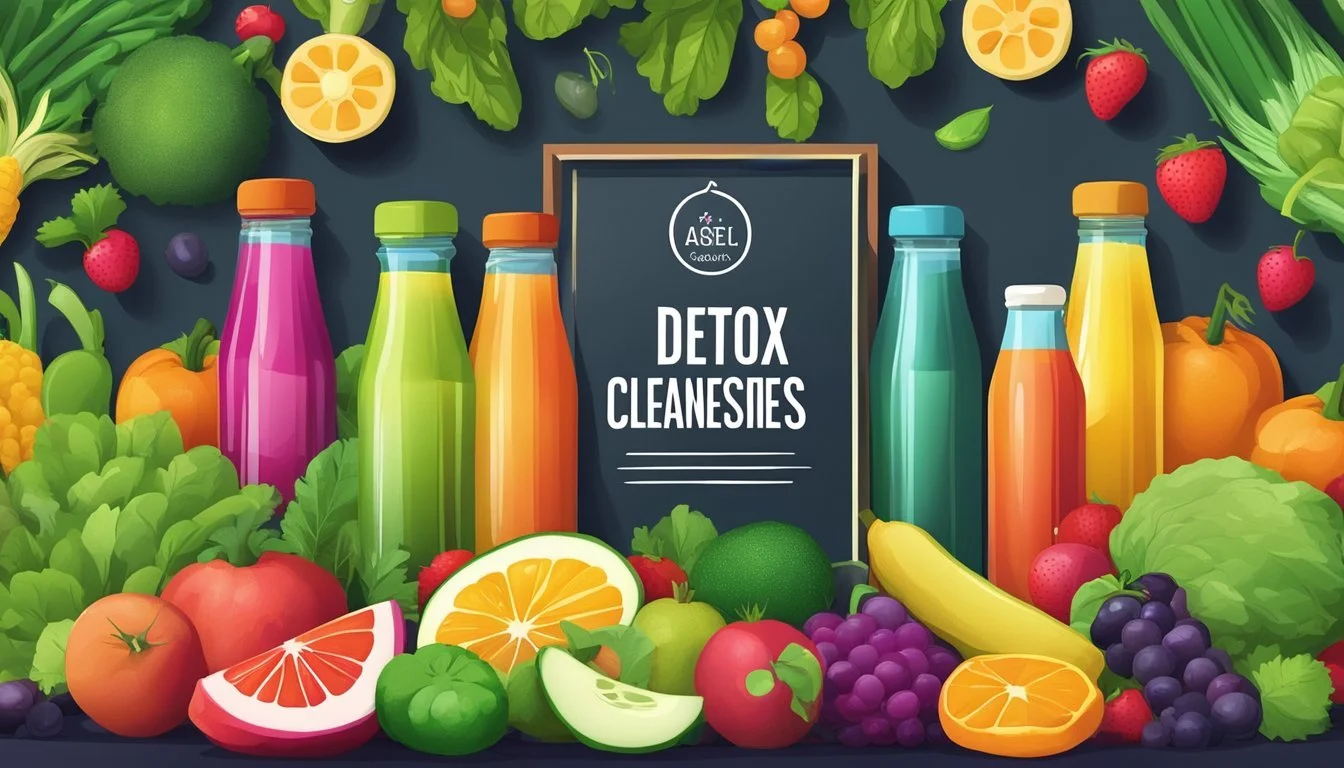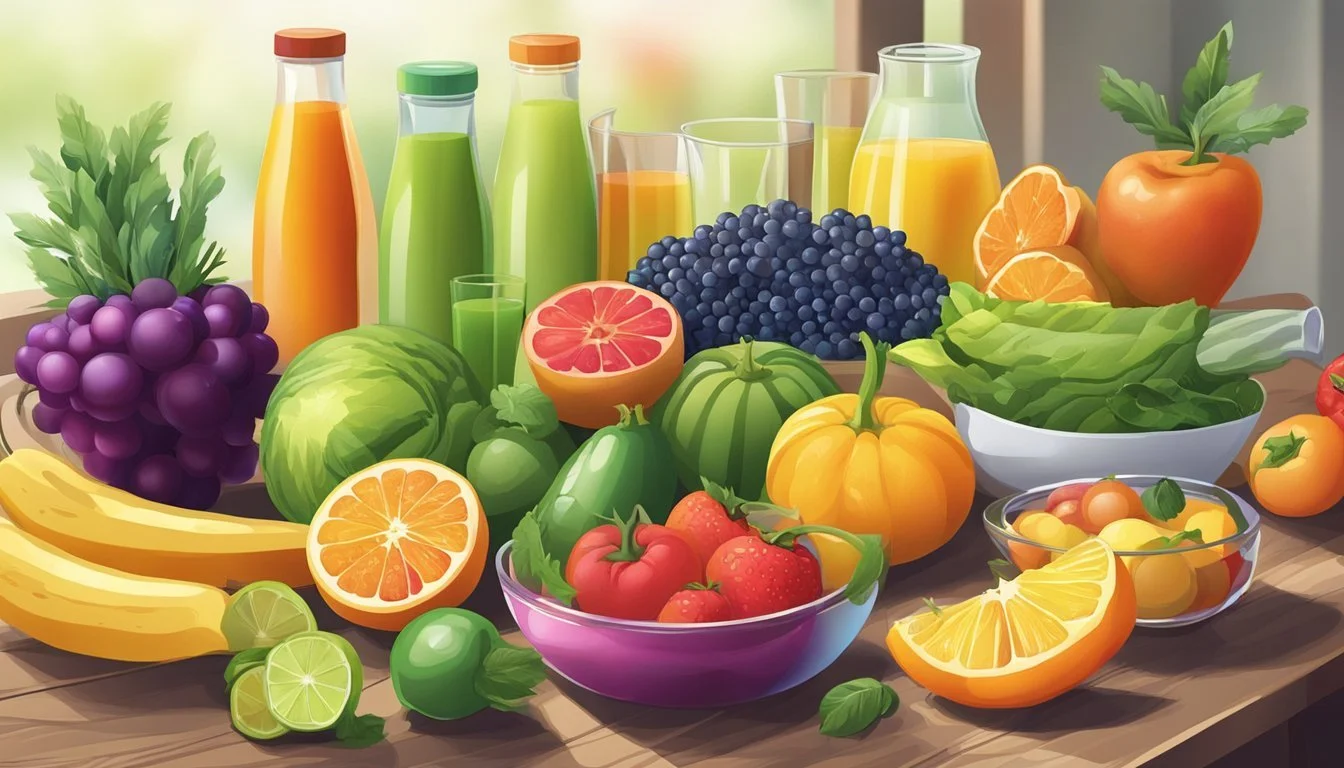Do You Need to Detox Your Body with Juice Cleanses?
Examining the Facts
A juice cleanse, also known as a juice detox, involves consuming only juice from vegetables and fruits for a certain period of time, typically ranging from 1 to 10 days. The practice is believed by some to release the body from the so-called toxins accumulated through diet or environmental factors, resetting the system and promoting weight loss. Proponents suggest that without the digestive workload of solid food, the body can focus on self-healing and cleansing.
However, the efficacy and necessity of juice cleanses for detoxifying are debated among health professionals. The human body is designed with its own sophisticated mechanism for detoxification with organs such as the liver, kidneys, and the digestive system constantly filtering and expelling waste and toxins. There is limited scientific evidence to support the idea that juice cleanses are an essential practice for detoxing. It is also important to note that while juices provide vitamins and minerals, they lack essential nutrients such as protein, fiber, and fats, which are vital for maintaining a healthy and balanced diet.
Before embarking on a juice cleanse, it's crucial to understand both the motivations behind this choice and the potential impacts on one's health. While some report feeling more energetic and experiencing weight loss, these effects may be temporary. Moreover, significant reductions in calorie intake and the absence of sufficient protein can lead to muscle loss and may trigger other health issues, such as blood sugar instability, and severe hunger pangs, affecting mood and energy levels.
Understanding Detoxification
Detoxification is a natural process the body undertakes to neutralize and eliminate toxins. These toxins come from various sources such as the environment, diet, and the body's own biological processes. The liver and kidneys play a crucial role in filtering out these substances.
The Liver: The liver chemically converts toxic substances into less harmful compounds, which are then excreted via feces or urine. It has a sophisticated system to deal with chemicals and toxins.
The Kidneys: The kidneys continuously filter the blood and get rid of waste products through urine.
Regarding detox diets, there is a common misconception that the body needs external help to detoxify. However, a well-functioning liver and kidneys typically cleanse the body efficiently. While science acknowledges the body can sometimes be exposed to high levels of toxic substances, it also indicates that healthy individuals already possess an effective detoxification system.
Juice cleanses, a type of detox diet, often claim to provide additional detoxification benefits. It is important to scrutinize these claims critically. Although increasing fluid intake supports kidney function, and certain foods contain compounds beneficial for liver health, there is limited scientific evidence supporting the efficacy of juice cleanses for enhancing the body's detoxification capacities beyond what it naturally does.
Detoxification is a complex topic with many nuances. The body is equipped with systems to handle toxins but it's essential to maintain a balanced diet and healthy lifestyle to support these natural processes.
What Are Juice Cleanses?
Juice cleanses, often referred to as juice fasts, are periods where individuals consume only fruit and vegetable juices to obtain nutrition while abstaining from solid food. This regimen is intended to support the body's natural detox processes.
Components of Juice Cleanses
Juice cleanses usually consist of a variety of fruit and vegetable juices. These juices are typically rich in vitamins, minerals, and antioxidants. The main components include:
Fruits: Apples, oranges, berries
Vegetables: Kale, spinach, beetroot
Liquids for Hydration: Water, coconut water, herbal teas
Claimed Benefits of Juice Cleansing
Proponents of juice cleanses believe they provide numerous health benefits, such as:
Enhancing detoxification
Boosting energy levels
Aiding weight loss
Improving the balance of healthy bacteria in the digestive system
Preparation for a Juice Cleanse
To prepare for a juice cleanse, one should gradually eliminate certain foods and substances from their diet, including:
Refined sugar
Meat
Dairy products
Wheat
Alcohol
Nicotine
This preparation phase is crucial to reduce potential withdrawal symptoms.
The Juice Cleansing Process
During the juice cleansing process, individuals strictly drink juices throughout the day, which may result in reduced calorie intake and a temporary break for the digestive system. It is essential to maintain proper hydration and to avoid solid food. The typical duration of a juice cleanse can range from a single day to several days.
Nutritional Considerations
When evaluating juice cleanses, it is essential to consider their nutritional profile, including macronutrient composition, micronutrient density, and fiber content.
Macronutrients in Juice Cleanses
Juice cleanses often lack sufficient macronutrients, which are essential for energy and bodily functions. The three primary macronutrients—proteins, carbohydrates, and fats—play vital roles in the human body.
Proteins: Crucial for cell repair and muscle growth, they are typically sparse in juice cleanses.
Carbohydrates: While fruit and vegetable juices are rich in carbohydrates, they often lack complex carbs that provide sustained energy.
Healthy Fats: These are necessary for nutrient absorption and brain health, but are usually missing from juice cleanse regimens.
Micronutrients and Antioxidants
Despite the macronutrient limitations, juice cleanses can be rich in micronutrients such as vitamins and minerals, which support numerous bodily functions, and antioxidants, which combat oxidative stress.
Vitamins and minerals: Juices made from a variety of fruits and vegetables can supply a range of essential nutrients.
Antioxidants: These are abundant in fruits and vegetables and may offer health benefits by neutralizing harmful free radicals.
The Role of Fiber
Fiber is a critical component of nutrition that supports the digestive system and contributes to satiety.
Dietary fiber found in whole fruits and vegetables is largely absent from juice cleanses because the juicing process typically removes the pulp and skin, where much of the fiber is concentrated.
Insoluble fiber promotes bowel regularity, while soluble fiber assists in blood sugar regulation and heart health.
Juice cleanses may provide a surge in certain vitamins and antioxidants yet fail to offer comprehensive nutrition due to the exclusion of key macronutrients and fiber.
Potential Benefits
The discussion around juice cleansing often centers on its purported benefits, from potentially aiding in weight loss to enhancing skin quality and boosting energy levels.
Weight Loss Perspectives
Juice cleanses are often adopted with weight loss as a primary goal. Supporters believe that they can lead to a reduction in calorie intake and may instigate changes in the gut microbiome, which could be favorable for shedding pounds. However, they should not replace a balanced weight management plan.
Calorie Restriction: Juice cleanses typically involve a lower calorie intake than a regular diet, which can lead to weight loss during the cleanse.
Gut Health: Some studies suggest that juice cleanses may alter the gut bacteria composition in a way that supports weight loss.
Effects on Skin and Energy Levels
Beyond weight loss, advocates for juice cleansing argue that it may confer additional health benefits. They suggest improvements in skin health due to the high intake of vitamins from fruits and vegetables and report an increase in energy levels, potentially from the body not having to digest solid foods.
Skin Health: The ingestion of vitamins and antioxidants present in juices might contribute to healthier skin appearance.
Energy Levels: With the digestive system less taxed by processing fibrous foods, individuals might experience a surge in energy.
Risks and Drawbacks
While juice cleanses are often marketed for their potential health benefits, they come with several risks and drawbacks that are important to consider. These can range from nutritional deficiencies to negative impacts on metabolism. Here is a closer look at some of the specific concerns.
Potential Nutritional Deficits
Juice cleanses typically lack fiber, protein, and fats, which are essential components of a balanced diet. Fiber is crucial for digestive health and regularity, while protein and fats are vital for repairing tissues and maintaining cellular functions. Prolonged juice cleanses can lead to the depletion of these nutrients, potentially causing long-term health issues.
Impact on Metabolism and Blood Sugar
The high intake of fruit juice can cause spikes in blood sugar levels due to the absence of fiber, which normally helps to regulate the release of insulin. These spikes can in turn affect metabolism and blood pressure. Additionally, the lack of solid food can slow down the metabolism as the body may go into a starvation mode, which is not conducive to sustainable weight loss and can strain the body's systems.
The Risk of Disordered Eating
Juice cleanses can sometimes lead to or exacerbate patterns of disordered eating. The restrictive nature of these diets may encourage an unhealthy relationship with food by valorizing certain food groups while demonizing others, leading individuals down a path that can result in a full-blown eating disorder. The focus on rapid weight loss can also perpetuate these risky behaviors and thought patterns.
Popular Juice Cleanse Ingredients
Juice cleanses often incorporate a variety of fruits and vegetables to provide essential vitamins and minerals. These ingredients are chosen for their nutritional benefits and cleansing properties.
Common Fruits Used
Apples: A staple in many juice cleanses, apples are rich in antioxidants and a good source of soluble fiber which aids in the detoxification process.
Berries: Berries, including blueberries and strawberries, are packed with antioxidants and phytonutrients. They add natural sweetness and are low in calories.
Citrus fruits: Oranges, lemons, and grapefruits provide high amounts of vitamin C and aid in alkalizing the body.
Fruits are often the base of juices due to their natural sugars and palatability, working synergistically with vegetables to enhance detoxification and nutrient intake.
Vegetables and Leafy Greens
Celery: Celery juice acts as a diuretic and helps to flush out toxins. It's also high in various compounds that can help reduce inflammation.
Spinach: Abundant in vitamin A and iron, spinach supports the body's detoxification mechanisms.
Kale: A nutrient-dense leafy green, kale is filled with detoxifying compounds and essential vitamins.
Cucumber: This vegetable is hydrating and contains important vitamins and minerals that support cleansing.
Vegetables and greens are essential in cleanses for their lower sugar content and high nutrient density, contributing to the body's ability to detoxify efficiently.
Comparisons to Whole Foods
When considering body detox, juice cleanses are often compared to consuming whole foods. This section examines how juices stand up against whole fruits and vegetables and a balanced diet, focusing on nutritional content and health benefits.
Juices Vs. Whole Fruit and Vegetables
Fruits and Vegetables:
Fiber Content: Whole fruits and vegetables are rich in dietary fiber, which aids in digestion and supports a healthy gut microbiome.
Nutrient Density: They provide a wide range of essential vitamins, minerals, and antioxidants in their natural state.
Juices:
Fiber Loss: Juicing often removes the fiber, which is critical for slowing sugar absorption and maintaining bowel health.
Concentrated Sugars: Juices can have higher sugar levels per serving compared to whole fruits and vegetables, potentially impacting blood sugar levels.
Juices Vs. Balanced Diet
Balanced Diet:
Consists of a variety of foods including whole grains, healthy fats, lean proteins, nuts, and seeds, in addition to fruits and vegetables.
Delivers a complex range of nutrients and a sustained energy supply through solid food intake.
Juices:
May lack significant sources of whole grains, healthy fats, and protein, which are essential for a balanced diet.
Provide quick, albeit possibly short-lived, bursts of energy and can miss out on the prolonged satiety that comes from solid food.
Alternatives to Juice Cleanses
When seeking to support the body’s natural detoxification processes, one can look beyond juice cleanses to more sustainable practices such as embracing a whole food diet or integrating smoothies and teas that promote hydration and nutrient intake.
Detoxifying With Whole Foods
One may find it beneficial to focus on whole foods rich in nutrients that can aid the body's natural detoxification pathways. This includes:
Whole grains: They provide essential fiber, which assists in digestion and the elimination of toxins.
Legumes: A source of protein and fibers which can support a balanced gut microbiome.
Nuts and Seeds: High in antioxidants and beneficial fats that contribute to overall health.
A balanced diet with these components can be a sustainable alternative to a juice cleanse, ensuring the body receives adequate fiber, hydration, and nutrition.
Incorporating Smoothies and Teas
Smoothies: A smart choice for those seeking nutrient-dense alternatives to juice cleanses. Unlike juicing, smoothies retain the fiber from whole fruits and vegetables, which can help maintain a feeling of fullness and provide the body with a spectrum of vitamins and minerals.
Teas: Known for their hydrating qualities and an array of health-promoting compounds, various teas can complement a balanced diet. For example, green tea is linked to supporting metabolic health, and herbal teas can contribute to overall fluid intake, crucial for bodily functions and supporting the body's natural detoxification processes.
Both smoothies and teas serve as functional beverages that increase one's water intake and can easily be integrated into a daily dietary routine to support the body's own detoxification systems without resorting to a restrictive juice cleanse.
Conclusion
Juice cleanses, often considered for detox and health purposes, have become a popular choice for those seeking a reset in their lifestyle. Companies that offer these cleanses suggest that the absence of heat and oxygen in the juice preparation helps maintain nutrient integrity.
Health Benefits and Risks:
Juice cleanses might increase healthy gut bacteria, which is linked with weight loss.
However, they may lack essential nutrients like protein, fiber, and fats, which can lead to feelings of hunger and possible deprivation.
Lifestyle Considerations:
They are typically recommended for a short duration and are not sustainable as a long-term dietary strategy.
One must be cautious and conscious of the body's responses throughout the process and acknowledge that returning to a normal diet requires a gradual reintroduction of foods.
Expert Perspectives: Nutrition experts often emphasize that the body has its own detoxification systems, such as the liver and kidneys, and they suggest that a well-balanced diet is more effective for maintaining health than periodic juice cleanses.
In lieu of extreme detox methods, incorporating fruits and vegetables directly into one's daily diet could provide similar benefits without the associated risks of juice-only regimes. It is advisable for individuals to consult with healthcare professionals before embarking on a juice cleanse to ensure it aligns with their specific health needs and goals.






